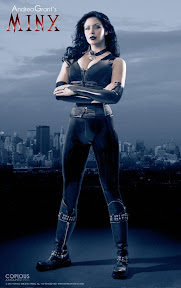
IPI: Indigenous Peeps in the Industry - 03

| In this installment of IPI, we get up close and personal with the "Pin-up Poet," herself, Andrea Grant. Andrea is the creator of MINX comic book series, "which merges Native American mythology" with fantasy, dreams, and reality. Andrea is a Coast Salish Canadian with a long list of creative talents, including: poetry, modeling, photography, 3D paintings, spoken word, live performance, author...and many more. (Don't be lazy - go see her website for more info!) div>After a long simmer on the back burner, and after a long summer on the back roads, Andrea was finally able to answer a few questions about being a Native person in the 'biz' with Michael Sheyahshe (Caddo). |
MS: Background info: what is your tribal affiliation and where are you from?
AG: I live in New York City in the East Village...I fought very hard to be here. I am originally from Vancouver Island, in Canada, and I am descended from the Coast Salish tribe, through my father.
MS: Did you have a lot of cultural interaction growing up? (Family gatherings, dances, ceremonies, etc.?)
AG: Unfortunately my Native grandfather suffered at the hands of residential schools...all kinds of horrors. I always felt my Native origins as a child, and as my brother and I grew older, our father connected more to his roots and we learned more and started going to pow-wows. I have always craved a deeper connection to my tribe, especially now that I live in such a metropolis. It’s interesting to note that several of my best friends in the States are part Native. But really, I feel very much the lone wolf out here.
MS: When did you first get into comics?
AG: I was always a writer working in several mediums and I had to think about longevity. I started out as a poet, and realized that hardly anyone cares about poetry these days. So I chose to twist around the Native tradition of storytelling and enter the field of comics. People thought I was crazy but I always felt I had a strong story to tell. I hoped that I could preserve some tribal mythology therein.
MS: Do you have a favorite comic; title or type?
AG: Neil Gaiman’s Sandman...and if you forced me to read it over and over for a thousand lifetimes, I would never get bored.

MS: Tell us more about the MINX you've been working on; how did it all start / come about?
AG: One day I woke up and decided I wanted to write a comic book because I felt the audience was intelligent and would accept my mixing mediums together.
MS: When can we expect it and where can we buy it?
AG: I am three issues deep into the series. The best bet is to get it directly from my website at www.copiousamounts.com/minx. I also have a spin-off called V-Train that runs quarterly in ‘Bombin’ Magazine...sort of Minx meets the Warriors. And I am revising my acumen right now to create a more mainstream version of the story… so stay tuned.
MS: Keeping in mind any of your other talents, what is your specialty?
AG: Being a couple of years ahead of what's popular...which is discouraging and painful when I first create something, and extremely gratifying when people understand it later on.
MS: Did you get special training and/or education for the comic book work?
AG: My training is in Creative Writing and English Literature. Otherwise, it's all just intuition.
MS: Have you worked on any other comics?
AG: Not yet.
MS: What are some comics with Native American characters in them that stand out to you?
AG: David Mack did a good job with the Daredevil spin-off a few years ago that featured the deaf character 'Echo' who was Native. Otherwise, none have fallen into my hands. I think there should be more. What an amazing way to preserve our beautiful, rich culture.
MS: What is your opinion about Indigenous characters in comics? Do you feel we are portrayed properly?
AG: Probably not. It's tough to convey the tonality of our culture. And let's face it, we're stoic...we don’t tell our secrets!
MS: Do you know of any other Natives in the "biz" (comic industry and/or video game industry)?
AG: I wish I did. I only know Native rappers from Canada. I live far away from my family so I haven’t gone to a pow-wow with my father for a few years...he's really outgoing and meets a lot of people. I’m quiet.

MS: Any words of wisdom for others (Native or non) looking to do what you do?
AG: Never give up, and don't look back. If people tell you that you can’t do something, fight harder and stay away from that kind of negativity – it's only jealousy. And stay disciplined because there are a thousand distractions every day that will take you further from your goals.
MS: Anything I've missed here? Anything you'd like to 'plug' (upcoming shows, debuts, etc.)?
AG: My projects are as follows:
www.copiousamounts.com/minx The Minx comic
http://www.andreagrant.com/ The Pin-Up Poet brand
http://www.copiousmagazine.com/ Which features other artists







